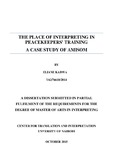| dc.description.abstract | This study assessed the need for and impact of interpreting in training of AU peacekeepers in the context of capacity building provided to the AU mission in Somalia by the UN through UNSOA. The stated research problem is based on the observation that UNSOA training activities constitute a multicultural encounter relying on English as a language of communication which is not necessarily the peacekeepers’ primary language.
The research objectives pursued were therefore (1) to investigate the impact of the language gap on the realisation of the training objectives, (2) to determine the effectiveness of the measures adopted by UNSOA to bridge the language gap during its training activities, and (3) to establish if the availability of in-house language services -specifically interpreting services- would significantly improve the achievement of UNSOA TS objectives.
The study collected data through evaluation forms completed by trainees at the end of pre-deployment training activities and UN logistics course, training reports produced at the end of each training by the training coordinators and a SurveyMonkey questionnaire used to collect the views of six main trainers and training coordinators. The data was analysed through the lenses of the intercultural communication conceptual framework and using statistical tools.
The key findings of the research are (1) both trainees and trainers opined that interpreting plays a key role in the training activities as it effectively bridges the language gap, ensures effective communication and interactions between trainees and trainers, (2) the services of an in-house interpreter/translator are key to effective training and capacity building activities for the benefit of AMISOM and (3) these services need to be made available on a permanent basis to ensure continued success of training activities in AMISOM; a multicultural mission.
The major conclusion of the study is that despite the fact that UNSOA TS, the Subject Matter Experts (SMEs) from other sections, trainers and trainees recognised the need for a permanent in-house
v
interpreter/translator, the delay in the recruitment process frustrated the continuity of these services and affected the efficiency of the training activities.
It is therefore recommended that UNSOA management supports the efforts of UNSOA TS to recruit on a continuous –possibly a permanent – basis a qualified language professional who can not only provide translation and interpretation services but also supervise a team of language specialists providing additional support for various language combinations as needed. | en_US |

